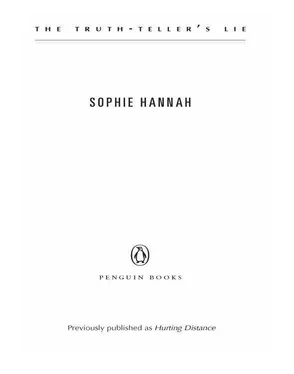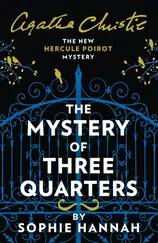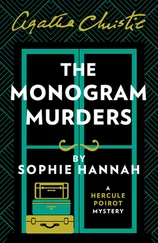‘She’s still a high-flier,’ said Gibbs, his face brightening at the sight of his steak pie emerging from the pub kitchen. ‘Except now she’s in the kidnap-and-sexual-assault business.’
‘What sort of impression did you get of her personality?’ asked Simon. The smell of Sellers’ fish and chips was making his mouth water. He’d have to buy himself a sandwich on the way back. ‘Manipulative? Devious? Defiant?’
‘Not really. An extrovert, lively, sociable. A bit manic, though, her dad said, and when she was stressed about work she could get ratty and unreasonable. He did tell me she had a temper, before the breakdown. The mum was pissed off, as you can imagine. Thought he’d landed Juliet in it. I didn’t point out how deep in it she was even before he opened his gob. The strangest thing was that both parents—everyone I’ve spoken to—talks as if there have been two Juliets, almost like two separate people.’
‘Pre- and post-breakdown?’ said Simon. ‘That can happen, I suppose.’
‘Her mum described the breakdown—what happened, you know.’ Sellers rubbed his eyes and swallowed a yawn. ‘Once she got going, I couldn’t stop her.’
‘What exactly did she say?’ Simon ignored the dismissive grunt that came from Gibbs.
‘One day Juliet was supposed to go round to her parents’ place for dinner, and she didn’t turn up. They phoned and phoned—nothing. So they went round. Juliet didn’t answer the door, but they could tell she was in—her car was there, and loud music was playing. In the end her dad broke a window. They found her in her work room, looking like she hadn’t eaten, slept or washed for days. She wouldn’t speak to them, either—just looked through them, like they weren’t there, and carried on working. All she said was, “I have to finish this.” She kept saying it, over and over.’
‘Finish what?’ Simon asked.
‘Whatever she was working on. Her mum said she used to get loads of commissions, and customers often wanted a fast turn around—presents, anniversaries. When it was done—in the early hours of the morning, after her mum and dad had sat and watched her half the night—they said, “You’re coming home with us,” and she didn’t resist or anything. It was as if she didn’t care what she did, her mum said.’
Gibbs nudged Sellers with his elbow. ‘Waterhouse is starting to feel sorry for her. Aren’t you?’
‘Go on,’ Simon said to Sellers. ‘If there’s more.’
‘Not much, really. Her parents asked her who the model was for, the one she’d been working on until three in the morning—they thought, if it was that urgent, maybe they could deliver it, you know—but Juliet had no idea. All that frantic work, saying she had to finish it, and she couldn’t even remember who it was for.’
‘She’d flipped,’ Gibbs summarised.
‘After that night, though, she wanted nothing to do with work, couldn’t even be in the same room as any of the stuff she’d made. She’d done a few for her parents, and they had to put them all in the cellar, so she didn’t see them. And all the ones from her own house went in the parents’ cellar too. And that was that—she’s not worked since.’
‘Yes, she has; she’s just had a change of career,’ said Gibbs. ‘She’s a workaholic, capable of driving herself mad—maybe that’s what happened this time as well. The kidnap-and-rape business was a runaway success, she couldn’t handle the pressure, so she lost it and went for her husband with a rock.’
‘Her mum said she knew something was wrong,’ Sellers spoke into his pint glass. ‘Now, I mean. Before she found out what’d happened to Robert.’
‘How come?’ Simon asked.
‘Juliet phoned out of the blue and said she wanted all the stuff back, all her pottery models.’
‘When was this?’ Simon did his best to conceal his annoyance. Sellers should have told him this first, the rest later.
‘Last Saturday.’
‘Two days after Haworth failed to show up for his meeting with Jenkins at the Traveltel,’ said Simon thoughtfully.
‘Right. Juliet didn’t explain, just said she wanted it all back. She went and got it on the Sunday. She was in a good mood, according to her mum—better than she’d been for a long while. That’s why her parents were so surprised when they heard—’
‘So the little houses that Naomi Jenkins saw in the Haworths’ lounge on the Monday . . . they’d been there less than twenty-four hours?’
‘So what?’ said Gibbs.
‘I don’t know. It’s just interesting. The timing.’
‘Maybe she was going to go back to it, making the models,’ Sellers suggested. ‘If she and Haworth had been involved in the rape thing together, and now he’s in hospital, and maybe never coming out . . .’
‘Yeah.’ Gibbs nodded. ‘She was planning to pretend all that never happened, and take up pottery again. She’s a real charmer.’
‘What about background on Haworth?’ said Simon. ‘And Naomi Jenkins?’
Sellers looked at Gibbs, who said, ‘Nothing yet on Haworth. And nothing on his sister Lottie Nicholls. I’ve been busy with the websites this morning, but I’ll chase it.’
‘Naomi Jenkins is straightforward,’ said Sellers. ‘Born and grew up in Folkestone, Kent. Went to boarding school, did very well. Middle-class background, mother a history teacher, father an orthodontist. Studied typography and graphic communication at Reading University. Plenty of friends and boyfriends. Lively, an extrovert . . .’
‘Just like Juliet Haworth,’ said Simon. His stomach rumbled.
‘Why don’t you order something to eat?’ Gibbs suggested. ‘Is it some kind of Catholic guilt syndrome? Punish the flesh to purify the soul?’
The old Simon would have wanted to floor him. But personality could change, in response to a traumatic or significant event. For ever after, you saw your life as divided into two distinct time zones, pre and post. At one time everyone, Gibbs included, was wary of Simon’s temper. Not any more. It had to be a good thing.
Simon had decided not to phone Alice Fancourt. It was too much of a risk. He’d be crazy to allow his feelings for her to destabilise him again. Avoid complication and trouble—that was the rule he tried to live by. His decision had nothing to do with Charlie. What did Simon care if she was pissed off with him? It wasn’t as if it hadn’t happened before.
He saw a fleeting panic in Sellers’ eyes at the same time as he felt cold air on the back of his neck. He knew who had swung through the pub’s double doors before he heard the voice.
‘Steak pie and chips. Fish and chips. I remember what it felt like to be unconcerned about cholesterol.’
‘Sir, what are you doing here?’ Sellers pretended to be pleased to see him. ‘You hate pubs.’
Simon turned round. Proust was staring at the food. ‘Sir, did you . . . ?’
‘I got your note, yes. Where’s Sergeant Zailer?’
‘On her way back from the hospital. I said so in the note,’ Simon told him.
‘I didn’t read it all, ’ said Proust, as if this should have been obvious. He leaned his hands on the table, making it wobble. ‘It’s a shame the DNA from the lorry doesn’t match Haworth’s. It’s another shame that Naomi Jenkins and Sandy Freeguard are insisting Haworth didn’t rape them.’
‘Sir?’ Sellers provided the required prompt.
‘We have a new complication. I like life when it’s simple. And this isn’t.’ The inspector picked up one of Sellers’ chips and put it in his mouth. ‘Greasy,’ was his verdict. He wiped his mouth on the back of his hand. ‘I’ve been answering your phones like a secretary while you lot have all been draped over a pub jukebox swilling ale. Yorkshire rang.’
Читать дальше












